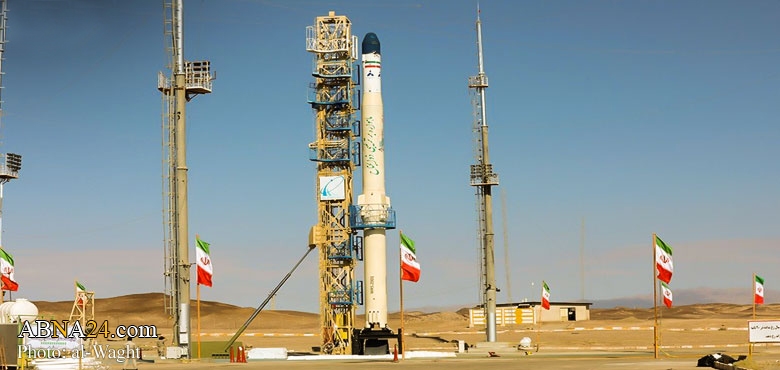AhlulBayt News Agency (ABNA): On Monday, Iran sent into space a new satellite launcher, achieving its “most powerful rocket engine.”
Videos and reports showed the “successful” test of the hybrid satellite carrier, dubbed Zuljanah.
Space authorities in Iran officially said that the space vehicle has no plan yet to launch satellites into the space and the launch was conducted mainly for testing, however.
Communications Minister Mohammad Javad Azari Jahromi, had said that Zuljanah hybrid satellite carrier "enters the launch process at a lower cost and can bear weight of more than one satellite." He had also said that the ground test of this satellite has now been completed successfully and field test will begin soon.
However, the test has met with widespread reactions. The US on Tuesday expressed concern over the test launch. A State Department’s spokesman said Washington is concerned about the efforts by Iran to develop space launch vehicles (SLVs) as they have the ability to advance Iran's ballistic missiles.
“These devices represent a serious risk of proliferation since they incorporate technologies identical to those used in ballistic missiles, including long-range missiles, and are interchangeable with them”, he told AFP, adding: “These trials allow Iran to gain experience and refine such technologies.”
Concerns about Iran's missile capability, which Tehran says are unjustified and unfounded, are not limited to Washington. They are also voiced by the US top ally in the region the Israeli regime. Tel Aviv expressed concern about the development of Iranian missile technology in a bid to blacken Iran's missile capability. In addition to the Israelis, some European countries, such as France, have made similar statements in recent days against Iran's missile progress, demanding that Iran stop tests.
Why are the West and Tel Aviv concerned about Iranian missile technology development?
Generally, Iran's space program, of which ballistic missile launches are a part, is aimed at strengthening commercial capacity and does not violate its international agreements.
On the other hand, senior Iranian officials have repeatedly stressed that the missile program is defensive, although at the same time they have ruled out any negotiations to limit it. At present, some Iranian missiles like Shahab 1, 2 and 3, Qayam1 and Emad use liquid fuel and others like Fateh, Zulfiqar and Sejil are solid fuel-powered.
The Islamic Republic also has an active and developed space program, and the launch of the "Omid", or Hope, satellite on February 2, 2009, into space was its first experience in this field.
The very continuation of Iran's space program is a clear sign of the nation’s progress and simultaneously failure of the policy of pressure and sanctions against Tehran. In other words, Iran’s space and missile development programs have always faced strong protests and anger from the US and its allies in the Europe. The missile program is one of the drivers behind the massive American sanctions against the country.
On the other hand, at the same time of the massive sanctions against Iran, and especially at a time when the Trump administration introduced its “maximum pressure” campaign against the Islamic Republic, Tehran was noticeably able to develop and advance the scientific and technical capabilities of its space and missile program. The peak of advances in this field is Zuljanah satellite rocket’s use of solid fuel in the first and second stages. The development of this scientific and technical capability against the backdrop of the sanctions and maximum pressure is a clear sign of the failure of pressure from the West against Iran, and it is this Western defeat that makes them strongly demand a halt to Iran's space and missile activities.
Another reason driving the West to negatively approach the Iranian scientific advances is a decades-long Iranophobia campaign in the region.
Iranophobia has been a constant policy of European countries and the Americans. Even through verbal attacks and unfounded claims about Iran's scientific potentials, they try to promote a fear of the Iranian progresses among the regional states. Interestingly, despite this negative propaganda and blackening campaign, many countries in the region do not pay much attention to propaganda against Iran's scientific and missile capabilities. Except for a couple of Persian Gulf Arab monarchies, mainly Saudi Arabia and the UAE, regional states like Turkey, Iraq, Pakistan, Azerbaijan, and even some Persian Gulf states like Qatar and Oman have close and warm ties with Iran and have never raised negative postures against their neighbor’s scientific and mainly missile advancements. This clarifies that the West’s heavily-funded Iranophobia has been a total failure in the region.
Missile capability a must for Iran
In the past two decades, Iran has made great efforts to develop and improve missiles and their accuracy. Currently, its missile power is one of the main deterrents among the country's armed forces to any foreign attack.
Most of the current Iranian fighters were purchased from the US in the 1970s. Iran has no way but developing its defense capabilities using asymmetrical warfare strategy and also developing its missile power, a strategy seen by many strategists as reasonable.
Another development in this regard is Iran's development of satellite carriers. Technically, a country with such capability can also produce missiles with a range of several thousand kilometers. This, thus, very well explains the US sensitivity to Iran's missile capability.
Many experts agree that in the event of any military conflict between Iran and the US, the latter will suffer heavy blows from Iranian missiles. The US missile defenses are far from being capable of intercepting all of the missiles fired by Iran, and the destruction of launch sites and platforms by multiple airstrike is unthinkable.
Due to this vulnerability the US is concerned about the Iran’s missile might and tries to put strains on the Islamic Republic under the ruse of their nuclear capability. These pressures have gone nowhere so far, however.

